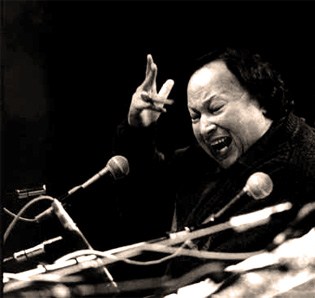In the world of music, as per The Therapeutic Magic of Sufi Music, few genres possess the captivating power to transport listeners to a realm of spirituality and emotion quite like Qawwali. Rooted in the mystical traditions of Sufism, this devotional form of music has a rich history and continues to influence both Eastern and Western audiences.
Qawwali, an age-old musical tradition, traces its origins to the Sufi mystics of the Indian subcontinent. It’s a musical expression of the deep spiritual connection between man and the divine. The word “Qawwali” itself is derived from the Arabic word “qaul,” meaning “utterance” or “word.” Thus, Qawwali is not just music; it’s a form of divine expression. At the heart of Qawwali lies the ensemble, consisting of a lead vocalist or Qawwal, a harmonium player, tabla player, and accompanying vocalists. The lead Qawwal often improvises verses, responding to the emotions of the audience and the moment, making each performance unique.
Nusrat Fateh Ali Khan: Known as the “Shahenshah-e-Qawwali” (Emperor of Qawwali), Nusrat Fateh Ali Khan transcended cultural boundaries with his powerful voice and mesmerizing performances. His rendition of “Allah Hoo” is an iconic example of his prowess, captivating audiences worldwide. Nusrat’s impact extended beyond music, as he introduced Qawwali to the Western world, collaborating with artists like Peter Gabriel and Eddie Vedder.

Sabri Brothers: Hailing from Pakistan, the Sabri Brothers, Maqbool Ahmed Sabri and Ghulam Farid Sabri, were instrumental in popularizing Qawwali in the 20th century. Their rendition of “Bhar Do Jholi Meri” continues to resonate with listeners, evoking intense spiritual emotions. Their work contributed significantly to the preservation and propagation of traditional Qawwali.

Qawwali serves as a vehicle for spiritual connection. Its devotional lyrics and entrancing melodies create an atmosphere that transcends religious boundaries, resonating with people of various faiths and beliefs. The genre’s fusion with contemporary music has expanded its reach. Collaborations with artists like A.R. Rahman, Jeff Buckley, and Michael Brook have brought Qawwali to new audiences, showcasing its adaptability and universality.
Qawwali has played a role in promoting peace and unity. It has been used as a medium to bridge cultural gaps and foster understanding among diverse communities. Renowned Qawwals have dedicated their lives to preserving and passing on this ancient tradition to younger generations, ensuring that its spiritual essence endures. Qawwali has had a profound impact on the Indian film industry, Bollywood. Iconic Qawwali songs in films like “Mughal-e-Azam” and “Barsaat Ki Raat” have left an indelible mark on Hindi cinema, making Qawwali an integral part of Indian music culture.

Qawwali is not just a genre of music; it is a spiritual journey, a connection to the divine, and a cultural bridge between people of diverse backgrounds. The powerful voices of Qawwals like Nusrat Fateh Ali Khan and the Sabri Brothers have resonated through time, leaving an indelible mark on the world of music and culture. Their devotion and artistry continue to inspire generations, ensuring that the soul-stirring melodies of Qawwali will forever echo in the hearts of those who listen.

